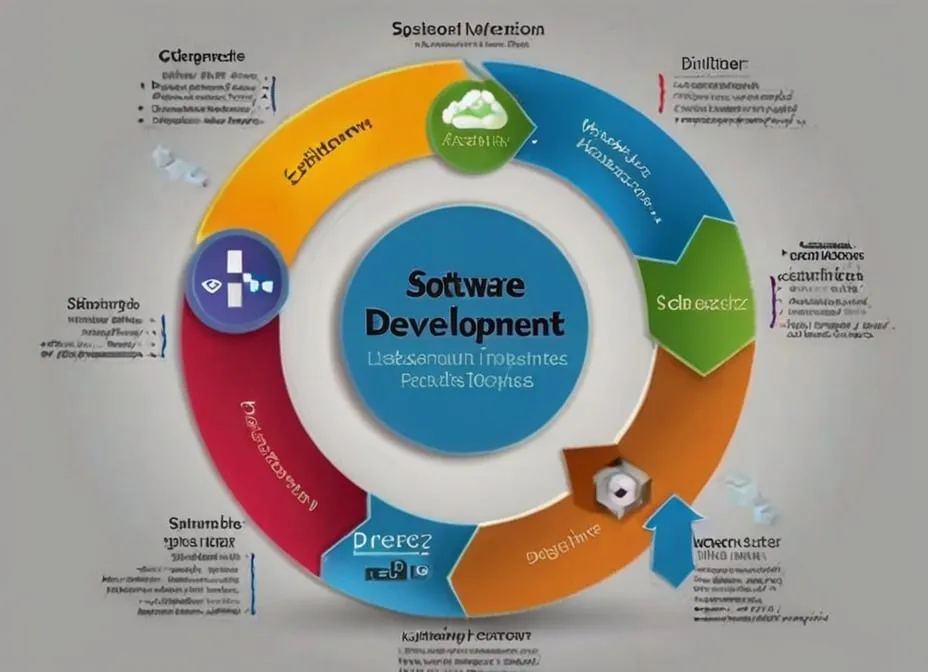Quantum Computing: The Future Beyond Classical Computers

Introduction to Quantum Computing: The Future of Information Processing
We live in an era where technology is advancing at an unprecedented pace. From smartphones to supercomputers, we've witnessed remarkable progress in computing power and information processing capabilities. However, as we push the boundaries of what's possible with classical computers, a new frontier is emerging – quantum computing. This revolutionary technology promises to shatter the limits of today's computing and usher in a new paradigm of information processing.
What is Quantum Computing?
Quantum computing is a field of study that harnesses the principles of quantum mechanics to perform calculations and process information in ways that are fundamentally different from classical computers. Instead of using traditional bits (0s and 1s), quantum computers utilize quantum bits, or qubits, which can exist in a superposition of both 0 and 1 simultaneously. This peculiar behavior, governed by the laws of quantum mechanics, allows quantum computers to perform certain calculations exponentially faster than classical computers.
History and Milestones of Quantum Computing
The concept of quantum computing dates back to the 1980s when Richard Feynman, a pioneering physicist, proposed the idea of using quantum systems to simulate other quantum systems more efficiently than classical computers. Building upon this idea, researchers like David Deutsch and Peter Shor made groundbreaking contributions, laying the theoretical foundations for quantum computing.
Since then, the field has witnessed numerous milestones, such as the development of the first quantum algorithms (Shor's algorithm and Grover's algorithm), the realization of the first practical quantum computers, and the achievement of quantum supremacy – a milestone where a quantum computer outperforms the world's most powerful classical supercomputer on a specific task.
Quantum Supremacy: The Holy Grail of Quantum Computing
Quantum supremacy is a term used to describe the point at which a quantum computer can solve a problem that is practically impossible for even the most powerful classical computers. In 2019, Google claimed to have achieved quantum supremacy with their 53-qubit quantum computer, Sycamore, which performed a specific calculation in 200 seconds that would have taken the world's fastest supercomputer 10,000 years.
While this achievement was a significant milestone, it's important to note that quantum supremacy is task-specific, and it doesn't necessarily mean that quantum computers are superior to classical computers in all aspects. However, it does demonstrate the potential of quantum computing and the possibilities that lie ahead.
Potential Impact of Quantum Computing on Various Industries
The implications of quantum computing are far-reaching, and its potential impact can be felt across various industries. From cryptography and cybersecurity to drug discovery and financial modeling, quantum computing promises to revolutionize the way we approach complex problems and unlock new frontiers of innovation.
In the realm of cybersecurity, quantum computers could potentially break many of the encryption methods used today, necessitating the development of quantum-resistant cryptography. In the pharmaceutical industry, quantum computing could accelerate the process of drug discovery and development by accurately simulating complex molecular interactions.
Financial institutions and logistics companies could leverage quantum computing to optimize their operations and make more informed decisions based on complex data analysis and simulations. Furthermore, quantum computing holds the promise of advancing artificial intelligence and machine learning by enabling more efficient training of models and tackling problems that are currently intractable for classical computers.
Principles and Concepts of Quantum Computing
To truly appreciate the potential of quantum computing, it's essential to understand the fundamental principles and concepts that underlie this revolutionary technology.

Quantum Bits (Qubits): The Building Blocks of Quantum Computers
In classical computing, information is represented using bits, which can have a value of either 0 or 1. However, in quantum computing, the basic unit of information is the quantum bit or qubit. Qubits can exist in a superposition of both 0 and 1 simultaneously, a phenomenon that is inherently quantum mechanical.
This superposition of states allows qubits to perform calculations in a massively parallel fashion, enabling quantum computers to explore exponentially more solutions simultaneously than classical computers.
Quantum Superposition and Entanglement
Quantum superposition and entanglement are two fundamental concepts that govern the behavior of quantum systems and enable quantum computing's unique capabilities.
Superposition is the ability of a quantum system to exist in multiple states simultaneously, a phenomenon that defies our classical understanding of the world. For example, a qubit can be in a superposition of both 0 and 1 at the same time, representing a combination of both states.
Entanglement is an even more peculiar phenomenon where the state of one quantum particle becomes correlated with the state of another particle, even if they are separated by vast distances. This interconnectedness allows quantum computers to perform certain calculations in parallel, leading to exponential speedups over classical computers.
Quantum Algorithms and Their Advantages
Quantum algorithms are designed to exploit the unique properties of quantum systems, such as superposition and entanglement, to solve specific problems more efficiently than classical algorithms.
One of the most famous quantum algorithms is Shor's algorithm, which can factorize large numbers exponentially faster than the best-known classical algorithms. This algorithm has significant implications for cryptography, as it can potentially break many of the encryption methods used today, which rely on the difficulty of factoring large numbers.
Another notable quantum algorithm is Grover's algorithm, which can search an unsorted database exponentially faster than classical algorithms. This algorithm has applications in various fields, including cryptanalysis, machine learning, and optimization problems.
Quantum Error Correction and Fault Tolerance
One of the major challenges in quantum computing is the fragility of qubits, which are susceptible to external noise and interference, leading to errors in computation. To overcome this challenge, researchers have developed quantum error correction techniques that can detect and correct errors during quantum computations.
Quantum error correction relies on the principles of redundancy and entanglement, where multiple qubits are used to encode a single logical qubit, allowing for the detection and correction of errors. Additionally, fault-tolerant quantum computing aims to design quantum circuits and algorithms that can operate reliably even in the presence of certain types of errors.
By addressing the issue of errors and decoherence, quantum error correction and fault tolerance pave the way for the development of large-scale, practical quantum computers capable of solving complex problems beyond the reach of classical computers.
Applications of Quantum Computing
The potential applications of quantum computing are vast and span various domains, from cryptography and cybersecurity to scientific simulations and artificial intelligence. Here are some of the most promising applications of this revolutionary technology:

Cryptography and Cybersecurity
One of the most significant impacts of quantum computing will be in the field of cryptography and cybersecurity. Quantum computers have the potential to break many of the encryption methods used today, which rely on the computational difficulty of factoring large numbers or solving certain mathematical problems.
Shor's algorithm, for instance, can factorize large numbers exponentially faster than classical algorithms, potentially rendering many current encryption methods obsolete. This has led to the need for the development of quantum-resistant cryptography, which aims to create encryption methods that are secure against attacks from both classical and quantum computers.
On the other hand, quantum computing also presents opportunities for enhancing cybersecurity. Quantum key distribution (QKD) is a method of securely distributing encryption keys using the principles of quantum mechanics, ensuring that any attempt to intercept the key is immediately detected.
Modeling and Simulation in Chemistry and Materials Science
Quantum computing holds immense potential in the field of chemistry and materials science, where accurate modeling and simulation of molecular structures and interactions are crucial for understanding chemical processes and developing new materials.
Classical computers struggle to simulate complex quantum systems due to the exponential growth of computational resources required as the system size increases. Quantum computers, however, can efficiently simulate these systems by leveraging the principles of quantum mechanics, such as superposition and entanglement.
This capability could revolutionize fields like drug discovery, catalyst design, and materials development, enabling researchers to accurately model and predict the behavior of molecules and materials, accelerating the process of innovation and discovery.
Optimization Problems in Finance and Logistics
Many optimization problems in finance and logistics, such as portfolio optimization, risk management, and supply chain optimization, involve finding the best solution from an exponentially large number of possibilities. Classical algorithms often struggle to find optimal solutions within reasonable time frames, especially as the problem size increases.
Quantum computers, with their ability to explore exponentially more solutions simultaneously, could provide a significant advantage in solving these complex optimization problems. By leveraging quantum algorithms like Grover's algorithm and quantum annealing, financial institutions and logistics companies could potentially make more informed decisions and optimize their operations for greater efficiency and profitability.
Quantum Machine Learning and Artificial Intelligence
Quantum computing has the potential to revolutionize the field of machine learning and artificial intelligence (AI). Certain machine learning tasks, such as training deep neural networks and solving combinatorial optimization problems, can benefit significantly from the computational power and parallelism offered by quantum computers.
Quantum algorithms for machine learning could potentially accelerate the training process, improve the accuracy of models, and tackle problems that are currently intractable for classical computers. Additionally, quantum computing could enable the development of new types of AI systems that can learn and adapt in ways that are fundamentally different from classical AI.
Quantum Computing in Life Sciences and Healthcare
The life sciences and healthcare industries stand to benefit greatly from the computational power of quantum computers. One area where quantum computing could have a significant impact is in the field of computational biology and bioinformatics.
Quantum computers could be used to simulate complex biological systems, such as protein folding and molecular interactions, with unprecedented accuracy. This could lead to a better understanding of biological processes and the development of more effective drugs and therapies.
Moreover, quantum computing could accelerate the analysis of vast amounts of genomic data, enabling more personalized and targeted treatments for various diseases. Additionally, quantum algorithms could be applied to medical imaging and diagnostic techniques, potentially leading to earlier and more accurate diagnoses.
Current State and Challenges of Quantum Computing
While the potential of quantum computing is undoubtedly exciting, the field faces several challenges that must be addressed before we can fully realize its potential.
Key Players and Major Quantum Computing Initiatives
The race to develop practical quantum computers has intensified, with major tech companies, research institutions, and governments investing heavily in this cutting-edge technology.
Companies like Google, IBM, Microsoft, and Amazon are at the forefront of quantum computing research and development, with initiatives like Google's Sycamore quantum processor, IBM's Quantum Experience, and Microsoft's Quantum Development Kit.
Government agencies and research institutions, such as the U.S. Department of Energy, the European Union's Quantum Flagship program, and the Chinese Academy of Sciences, are also making significant investments in quantum computing research and infrastructure.
Technological Challenges: Scaling Up and Coherence Times
One of the major challenges in quantum computing is scaling up the number of qubits while maintaining their stability and coherence. Coherence time refers to the duration for which qubits can maintain their quantum states before decoherence occurs, causing errors in computation.
As the number of qubits increases, the complexity of controlling and maintaining their quantum states increases exponentially. This challenge is exacerbated by the fragility of qubits, which are susceptible to external noise, interference, and other environmental factors.
To overcome this challenge, researchers are exploring various approaches, such as improving qubit design, developing better error correction techniques, and exploring new qubit technologies like topological qubits and ion traps.
Ethical and Security Considerations
As with any transformative technology, quantum computing raises ethical and security concerns that need to be addressed. One major concern is the potential impact of quantum computing on cryptography and cybersecurity.
As mentioned earlier, quantum computers could potentially break many of the encryption methods used today, posing significant risks to data privacy and security. This has led to the urgent need for developing quantum-resistant cryptography and updating cybersecurity protocols.
Additionally, there are concerns about the potential misuse of quantum computing for malicious purposes, such as cracking encryption codes or conducting advanced cyberattacks. As quantum computing becomes more powerful, it is crucial to establish ethical guidelines and security measures to mitigate these risks.
The Quantum Computing Race and Geopolitical Implications
The race to develop practical quantum computers has also taken on geopolitical dimensions, with major nations vying for technological supremacy in this field.
Countries like the United States, China, and the European Union are investing heavily in quantum computing research and development, recognizing its potential strategic importance and economic implications.
The winner of this race could gain a significant advantage in areas such as cybersecurity, scientific research, and industrial applications, potentially shifting the balance of power in the global landscape.
This geopolitical competition has also raised concerns about the potential for quantum computing to be used for military purposes or to gain strategic advantages over adversaries, further highlighting the need for international cooperation and ethical guidelines.
Future Outlook and Potential Impact of Quantum Computing
As quantum computing continues to advance, its impact on various aspects of our lives and the future of technology is becoming increasingly evident.

Quantum Computing and the Fourth Industrial Revolution
Many experts believe that quantum computing will be a key driver of the Fourth Industrial Revolution, a new era characterized by the convergence of physical, digital, and biological technologies.
Quantum computers' ability to solve complex problems and simulate quantum systems could lead to breakthroughs in fields like materials science, energy production, and biotechnology, enabling the development of new materials, more efficient energy sources, and innovative medical treatments.
Moreover, the integration of quantum computing with other emerging technologies, such as artificial intelligence, the Internet of Things (IoT), and advanced manufacturing techniques, could create entirely new industries and disrupt existing ones.
Quantum Internet and Quantum Communication
While the development of quantum computers is a significant milestone, another area of quantum technology that holds immense potential is quantum communication and the quantum internet.
The quantum internet is a theoretical concept that envisions a network of quantum devices capable of transmitting and processing information securely using the principles of quantum mechanics, such as quantum entanglement and quantum teleportation.
This could revolutionize secure communication, enabling the transmission of information that is fundamentally unhackable and unbreakable, even by future quantum computers. Additionally, the quantum internet could enable new applications like distributed quantum computing, where multiple quantum computers work together on a single problem, and quantum sensing for highly precise measurements.
Quantum Supremacy and Its Implications
As quantum computers continue to evolve and increase in computational power, the concept of quantum supremacy – the ability of quantum computers to solve problems that are practically impossible for classical computers – becomes increasingly relevant.
Achieving true quantum supremacy, where quantum computers can outperform classical computers on a wide range of practical problems, could have profound implications for various industries and scientific fields.
From simulating complex quantum systems in chemistry and materials science to solving optimization problems in finance and logistics, quantum supremacy could unlock new frontiers of knowledge and innovation, potentially leading to breakthroughs that were previously unimaginable.
Quantum Computing and the Future of Computing Paradigms
The emergence of quantum computing also raises questions about the future of computing paradigms and the potential limitations of classical computing.
As we approach the physical limits of Moore's Law and the miniaturization of transistors, quantum computing could offer a viable alternative for continuing the exponential growth of computing power.
However, quantum computing is not necessarily a direct replacement for classical computing, but rather a complementary technology that excels at certain types of problems that are intractable for classical computers.
The future might involve a hybrid approach, where classical and quantum computers work together, leveraging their respective strengths to tackle complex problems and drive technological innovation.
Conclusion: Embracing the Quantum Era
The advent of quantum computing represents a paradigm shift in the world of information processing and computing. As we stand on the cusp of this quantum revolution, it is clear that this technology has the potential to transform various industries, scientific fields, and our understanding of the universe itself.
Summary of Key Points
Throughout this article, we have explored the fundamental principles and concepts of quantum computing, its potential applications, and the current state and challenges of this emerging field. We have discussed the unique properties of qubits, quantum superposition, and entanglement, which enable quantum computers to perform certain calculations exponentially faster than classical computers.
We have also delved into the potential applications of quantum computing, ranging from cryptography and cybersecurity to scientific simulations, optimization problems, and artificial intelligence. These applications highlight the far-reaching impact that quantum computing could have on various industries and scientific disciplines.
Additionally, we have examined the current state of quantum computing, including the key players and major initiatives, as well as the technological challenges that must be addressed, such as scaling up and maintaining qubit coherence. We have also discussed the ethical and security implications of quantum computing, particularly its potential impact on cryptography and the need for developing quantum-resistant encryption methods.
The race to develop practical quantum computers has also taken on geopolitical dimensions, with major nations investing heavily in this technology, recognizing its potential strategic importance and economic implications. This race has raised concerns about the potential misuse of quantum computing for malicious purposes and the need for international cooperation and ethical guidelines.
Potential Societal and Economic Impact of Quantum Computing
The impact of quantum computing is not limited to the technological and scientific realms; it has the potential to profoundly shape our society and economy as well.
From a societal perspective, quantum computing could lead to significant advancements in areas such as healthcare, education, and environmental sustainability. For instance, the ability to accurately simulate complex biological systems could lead to the development of more effective drugs and personalized treatments, while quantum computing's potential in materials science could pave the way for more efficient energy production and sustainable technologies.
Economically, quantum computing could create new industries and disrupt existing ones, leading to shifts in employment patterns and the need for reskilling and upskilling of the workforce. Countries and companies that embrace quantum computing early on could gain a significant competitive advantage, driving innovation and economic growth.
However, it is crucial to address the potential negative impacts and ensure that the benefits of quantum computing are distributed equitably across societies and industries.
Preparing for the Quantum Revolution
As we approach the era of practical quantum computing, individuals, organizations, and governments need to prepare for this technological revolution.
Educational institutions must adapt their curricula to incorporate quantum computing concepts and skills, fostering a workforce equipped to navigate this new paradigm. Interdisciplinary collaboration between researchers, engineers, and policymakers will be crucial in addressing the challenges and exploring the full potential of quantum computing.
Governments and regulatory bodies must establish appropriate legal frameworks and guidelines to ensure the responsible development and deployment of quantum technologies, while also promoting innovation and international cooperation.
Furthermore, businesses must assess the potential impact of quantum computing on their respective industries and develop strategies to leverage this technology for competitive advantage. This may involve investing in quantum computing research, forming partnerships with leading quantum computing companies, and exploring new business models and opportunities enabled by quantum computing.
Final Thoughts and Outlook
The journey towards practical quantum computing has been long and challenging, but the potential rewards are immense. As we stand on the precipice of this technological revolution, it is crucial to embrace the quantum era with a sense of wonder, curiosity, and responsible stewardship.
While the path ahead is uncertain, one thing is clear: quantum computing promises to push the boundaries of what is possible, unlocking new frontiers of knowledge and innovation. From solving complex problems in cryptography and scientific simulations to revolutionizing fields like artificial intelligence and materials science, quantum computing has the potential to transform our world in ways we can scarcely imagine.
As we navigate this uncharted territory, it is essential to approach quantum computing with a spirit of collaboration, ethical responsibility, and a commitment to harnessing its power for the betterment of humanity. By embracing this transformative technology and addressing its challenges head-on, we can usher in a new era of discovery, innovation, and progress that will shape the future of computing and our understanding of the universe itself.
FAQs
- What makes quantum computing different from classical computing? Quantum computing is fundamentally different from classical computing in its use of quantum bits, or qubits, which can exist in a superposition of both 0 and 1 simultaneously. This quantum superposition, along with the phenomenon of quantum entanglement, allows quantum computers to perform certain calculations exponentially faster than classical computers.
- What are some of the key applications of quantum computing? Some of the most promising applications of quantum computing include cryptography and cybersecurity, scientific simulations in fields like chemistry and materials science, optimization problems in finance and logistics, quantum machine learning and artificial intelligence, and computational biology and drug discovery in the life sciences and healthcare industries.
- What are the major challenges in developing practical quantum computers? One of the primary challenges in quantum computing is scaling up the number of qubits while maintaining their stability and coherence. Additionally, addressing the fragility of qubits and developing robust quantum error correction techniques is crucial. Other challenges include ethical and security considerations, as well as the geopolitical implications of the quantum computing race.
- How can quantum computing impact the future of computing paradigms? Quantum computing could offer a viable alternative for continuing the exponential growth of computing power as we approach the physical limits of classical computing. However, it is not necessarily a direct replacement for classical computing but rather a complementary technology that excels at certain types of problems. The future may involve a hybrid approach, where classical and quantum computers work together, leveraging their respective strengths.
- What steps need to be taken to prepare for the quantum computing revolution? To prepare for the quantum computing revolution, educational institutions must adapt their curricula to incorporate quantum computing concepts and skills. Interdisciplinary collaboration between researchers, engineers, and policymakers is crucial. Governments must establish appropriate legal frameworks and guidelines, while businesses must assess the potential impact and develop strategies to leverage quantum computing for competitive advantage.










